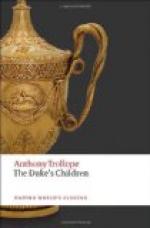Then his mind recurred to a more immediate and, for the moment, a heavier trouble. He had as yet given no answer to that letter from Mrs Finn, which the reader will perhaps remember. It might indeed be passed over without an answer; but that was impossible. She had accused him in the very strongest language of injustice, and had made him understand that if he were unjust to her, then would he be most ungrateful. He, looking at the matter with his own lights, had thought that he had been right, but had resolved to submit the question to another person. As judge in the matter he had chosen Lady Cantrip, and Lady Cantrip had given judgement against him.
He had pressed Lady Cantrip for a decided opinion, and she had told him that she, in the same position, would have done just as Mrs Finn had done. He had constituted Lady Cantrip his judge, and had resolved that her judgement should be final. He declared to himself that he did not understand it. If a man’s house be on fire, do you think of certain rules of etiquette before you bid him send for the engines? If a wild beast be loose, do you go through some ceremony before you caution the wanderers abroad? There should not have been a moment! But, nevertheless, it was now necessary that he should conform himself to the opinion of Lady Cantrip, and in doing so he must apologise for the bitter scorn with which he allowed himself to treat his wife’s most loyal and loving friend.
The few words to the Duke had not been difficult, but this letter seemed to be an Herculean task. It was made infinitely more difficult by the fact that Lady Cantrip had not seemed to think that the marriage was impossible. ’Young people when they have set their minds upon it do so generally prevail at last!’ These had been her words, and they discomforted him greatly. She had thought the marriage to be possible. Had she not almost expressed an opinion that they ought to be allowed to marry? And if so, would it not be his duty to take his girl away from Lady Cantrip? As to the idea that young people, because they have declared themselves to be in love, were to have just what they wanted,—with that he did not agree at all. Lady Cantrip had told him that young people generally prevail at last. He knew the story of one young person, whose position in her youth had been very much the same as that of his daughter now, and she had not prevailed. And in her case had not the opposition which had been made to her wishes been most fortunate? That young person had become his wife, his Glencora, his Duchess. Had she been allowed to have her own way when she was a child, what would have been her fate? Ah what! Then he had to think of it all. Might she not have been alive now, and perhaps happier than she had ever been with him? And had he remained always unmarried, devoted simply to politics, would not the troubles of the world have been lighter on him? But what had that to do with it? In these matters it was




